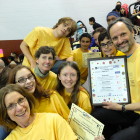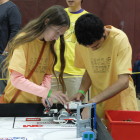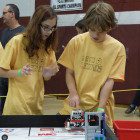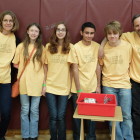What is the future of learning?
A South Orange Middle School (SOMS) robotics team is heading to the robotics state championships in large part for their answer.
The Lego Legends, made up of SOMS eighth graders, qualified for the North New Jersey First Lego League state championships on the strength of their extensive research to help middle school students concentrate better in class.
Mary Arevalo, Mateo Fuentes, Stephen Lehren, and Miranda Lipetz earned the Project Award at the Montclair Society of Engineers’ robotics qualifying event on Nov. 22.
The Project Award is for best solution to a real-world problem. It is the second year in a row that the team has won the award.
The award, along with their high marks in other areas – robot design, how well they work as a team, and how well their robot accomplished tasks in a timed competition – earned the team the privilege of going to the state championships.
The team researched “calming manipulatives” that could be used to help students with ADHD and others who like to fidget in class. They cited research that showed how some children with ADHD can benefit from having access to objects that can be manipulated quietly, and that they then concentrate better on classroom work. Manipulatives may help children gain some needed sensory input while still attending to the lesson.
For their project, the team designed a textured pencil case to keep fidgety hands busy. Judges said their informative presentation “took into consideration both teachers and students, and is a clever, inexpensive solution to the problem of wandering student concentration in classes.”
The Lego Legends shared their work with Melissa Butler, a South Orange Middle School educator who recently won a prestigious national award known as the Bammy, presented by the Academy of Education Arts and Sciences International. An English Language Arts teacher, Ms. Butler was recognized for revolutionizing the reading and writing workshop with state-of-the art tools and methods.
The competition is part of the international First Lego League robotics competition, where students ages 10 to 14 demonstrate skills in designing robots as well as researching real-world problems and proposing innovative solutions.
This year’s theme, “What is the future of learning?” asked robotics teams around the world to redesign how we gather knowledge and skills in the 21st century. The goal was to teach adults about the ways kids need and want to learn.
The team scored stellar marks for how they worked together as a team, and how they designed their robot. In a timed competition, their robot placed in the top ten in total points for tasks accomplished.





